A constant synergy exists between Jayda G and the dancefloors she commands. You’ll hear her showcasing the vibrant sounds that put her on the map, and at the same time feel her cultivate and build up off the energy that the room gives her, creating a musical harmony that you truly feel united with as a dancer. The undeniably genuine energy she brings to the club is crucial, reminding us why we seek refuge on the dancefloor in the first place. In times where a lot of DJ sets can feel voyeuristic or even impersonal, Jayda successfully knows how to restore humanity, compassion and love back to the club experience. There is a light that radiates from everything that she does.
Her back catalogue is no different. Her previous EPs on Freakout Cult and 1080p carried a collective warmth about them, and her most recent Sacred Spaces EP lifts this energy to a new level. As the first release via her own label JMG Recordings, the EP helps listeners traverse in what feels like a deeply personal and spiritual space of worship for house music, with two tracks bearing vocals from long-time friend Alexa Dash and her brother Sol G. The near future will see Jayda releasing her debut album via Technicolour, a sub-label on Ninja Tune, as well as further releases on JMG recordings. Truancy Volume 222 by Jayda G is here to make you feel good, with an array of disco from all over the world from India to Brazil, as well as some music from Jayda herself and contemporaries. We caught up with Jayda discuss her past year, staying grounded, live shows, her work to come and much more.
Hi Jayda! How have your past couple of weeks been? “I’m doing well! You’re catching me during some down time. I’m in the middle of taking summer holidays off, so I’m in Canada chilling at my parents house. The last couple of months have been really intense. I’ve had a lot of shows and really been feeling the response of the fans and how my name has gotten around a little bit more. Then also in the middle of this, I defended my master’s thesis so that added a whole new layer to things. That also was also super intense, and I’m so happy that it’s done. It’s been hardcore but good. A lot of good things.”
How was the thesis defense for you? “Oh man, I’ve never been so nervous in my entire life. It’s really funny because so many of my science peers were like “What? How can you be nervous about your defense? You play in front of thousands of people every weekend?” But when you do your thesis you’re being judged on your work. When you’re DJing, everyone’s there to party it up with you! [laughs] so it’s just not the same thing at all. So I was incredibly nervous, it was really an intense time as I had to squeeze my defense in between a ton of festival shows. But it went well and I passed!”
You’re currently in Grand Forks, where you grew up. You’ve told me that you were surrounded by nature while growing up. Having lived in LA, Vancouver and Berlin since then, how is it for you to live in a city? How do you ground yourself, especially now you’re on the road so much? “Coming home is super important to me, because of all the things you just said. It is very grounding for me to be in my heart place. I’m surrounded by mountains, trees, fresh airs, lakes, bears and all that. It’s very centering for me, and I need to come back here at least once a year to keep my sanity and remind me of who I actually am. In general, for people in entertainment, it’s very easy to get lost. To lose yourself, to become disassociated from yourself. You’re constantly in demand and having to give energy to your audience.”
“It’s funny that you ask this, because my latest EP was called Sacred Spaces, and it was based off of what my friend told me – we had this exact conversation. How do you align yourself when you’re away from the place that would do that for you automatically? You have to find spaces that are sacred to you wherever you go to help you align yourself. So for me that’s my apartment in Berlin, or certain friends’ houses, and in the end, the ultimate sacred space is within yourself. Meditating and trying to center yourself amongst the chaos is the key. That’s kind of what that whole EP was based off: finding those sacred spaces. The three tracks that were on the EP were all very spiritual, they were all kind of talking about either nature or losing yourself in the music or kind of having a very lyrical choir-esque feeling, that I imagine contribute to finding those sacred spaces.”
I was talking to my mom about something similar recently. We were talking about the impact of moving and she talked about something my grandfather used to say – Wherever you move to, you’ll always bring your mind with you. So there’s no real thing like escaping and so I definitely feel you on the part about having sacred spaces within yourself. At the same time, I do think cities can surround you with so much noise when you’re trying to listen to yourself. “There’s so much noise. It’s so loud. Where I grew up, it’s literally silent. There’s no street lights, so it’s pitch black at night, it’s great. You know, it’s an adjustment. When I was a lot younger, I almost kind of struggled with it. I wanted to move to the city, be with people who didn’t know me, and foster new relationships. But then as you get older you realize how valuable it is to grow up with the same people you’ve known since you’re born. I don’t know if a lot of people can say that. There’s pros and cons to both. It’s not for everybody but for me I feel like I straddle between the two constantly in terms of what my needs and wants are in life.”
What are the pros of city life? “That there’s people! [laughs] Living in a city like Berlin, it’s super multi-cultural and you get to meet people from all different backgrounds. This has been so great for me as a person of colour who grew up relatively isolated in a predominantly white environment. I’m so grateful to have those different perspectives in my life now. The cons are that it’s hard to get away from people! In Grand Forks, you can go hiking for an hour and you won’t see a soul. There’s something really special about that. Something I actually think a lot of people in the city don’t even know how to deal with. Like being truly alone with your thoughts.”
Can you tell us a little bit about how you grew up with music, both consuming and creating music? “I’ve got a pretty strong classical training in playing music, both in violin and piano. Both my mom and dad have a pretty strong musical background. I grew up with a lot of opera, and my dad was super into blues, rhythm and blues and jazz, so those were genres that were constantly around me. My dad was an avid music collector in general. Back when you didn’t have the internet, you got catalogues. He would get monthly music catalogues and you would pick the music from them. I always think about that now, like, wow you’d buy things without listening to them first!”
That’s when music writing was essential I guess, that’s all that’s selling it to you! “Right? So I remember that as a child very distinctly. And then my brother worked in music for many, many years. He worked for pretty big labels and so we would get sample boxes in the mail. We’d get promo CD copies from like TLC, Faith Evans and D’Angelo – I got my first D’Angelo CD from my brother like that. Things like that have heavily influenced me over time.”
“As a pre-teen I got more deep into my own music taste so I used to hunt tracks on Limewire every day for hours after school and make my own mix CDs. That was my early discovery music days. Then I also went through another phase of how to discover new music between 2010 and 2013. That’s when I really seriously started to collect records, taught myself how to DJ and really started delving deeper into house music. It’s also when I started learning how to make music. I didn’t learn how to make music until around 2014, so it has not been that long, but I’ve been playing music since forever.”
When was it that you really started collecting house music, when you moved to Vancouver? “I lived in Los Angeles for some time and I started listening to house music a lot more during that time. I used to listen to this weekly radio show in LA by Mathieu Schreyer on KCRW and he would play a lot of house music, amongst many other things. That slowly started pushing me more towards it. Also people who surrounded me at the time were into it at the time, so I was just really exposed to it a lot. When I moved to Vancouver, I was already into that shit. I was purposely seeking out friends who had a mutual appreciation for this. At that time I had lived in Grand Forks, Maui, then LA, so I had lived in a time of isolation, especially when I taught myself to DJ. As a result, when I moved to Vancouver, I sought out people to to share this mutual appreciation with. That’s when I met LNS, Mood Hut and all the well known Vancouver crew.”
You’ve lived and travelled in a bunch of places and digging for records is one of your favourite pastimes. Can you share with us some of your most memorable and favourite places worldwide to go digging? “Digging is always a very personal thing. Everyone has their own way of going about it. I personally am the type of person who doesn’t like going digging for like thirty minutes. I don’t like to be rushed. If I only have a short period of time, I’d rather not do it because I’d just get upset as I’d find stuff and not have enough time. When I go digging I usually set aside a big chunk of time, hours and hours. I really like digging on my travels too. Especially the States, because my musical taste is so influenced by US. I definitely always block out time in NYC, Detroit and Chicago.”
“I love to dig around in the world too. In December I did an Asia tour, so I got to dig in Hong Kong and in India, which was quite an experience. It’s hard to find records in India but there was one main spot I got taken to in Delhi, which was a trip. In Europe you have your own listening station and whatnot, and here you had this one super old turntable in the store where the highs were super high, and there’s about seven other employees there with you. It’s so funny because here, we’re used to skipping through a record to listen to it, putting the needle at the start, middle, end to get an idea of the record. Well, I started doing this at this store in Delhi, and the guy was like “No, no, no! You have to start it from the beginning!” I wasn’t allowed to skip through it. I was there for hours! [laughs] It was hilarious. The coolest part was that everyone who was working there was singing along to all the records. It just showed what an integral part of their culture Bollywood is, and I was witnessing that in the store. It was so awesome. That’s a very different digging experience I had.”
“Another experience was when I went to South Africa in Cape Town – I met the guy Sugar from the documentary Searching for Sugarman. South Africa also only has a handful of record stores so there’s the one store Sugar owns in Cape Town, but I was also able to book an appointment to visit his private basement where you can dig for records. When you’re traveling, the cool thing is you see how things crossover musically. You get to see what locally specific is part of the culture, but also you see how, for example, prevalent late seventies disco from the US is everywhere. You see how things weave in and out musically and culturally as you’re digging, so that’s very nice. And it helps you get to know places as well.”
I can imagine how when you’re touring, your idea of a place is heavily influenced by the lens of the promoter. “Yeah I mean, aside from my DJing career – as an avid traveler regardless, the biggest goal of traveling is to meet someone who actually lives in wherever you’re going, so that they can show you the place from a local perspective. So that’s what’s cool because when you meet promoters, you often get a first-hand experience of what a place is like. Not a lot of people get to experience that, so I consider myself super lucky in a lot of ways.”
You’ve mentioned in the past that one of the reasons for starting your own label, JMG Recordings, to be that you like to get into the nitty gritty of getting records out yourself. What is your vision for the label, and what is the feeling you’re operating on? “With Freakout Cult folding and always knowing this in the back of my mind, I wanted another platform to easily release my own work on, and stay heavily involved in the inner workings from the pressing and releasing. I like to stay involved in those details. Taking what I learned from DJ Fett Burger and starting my own label was a no-brainer. The essence really is just a platform for me, to release music that I love and believe in without being dictated by a third party. In terms of aesthetic, I’m heavily influenced by the American disco era of course. For JMG sessions, it’s a continuation of that aesthetic. It’s also a platform for me to get mixes to the public. When you first start off as a DJ, you’re just putting out mixes on your own Soundcloud for yourself and they don’t belong to another platform. JMG Sessions was a way for me to get back to that a little bit, without having to go so far back that I literally just put things on Soundcloud without context. It’s a way to see the evolution of my DJing and mixes over time. I can just do things that I’m feeling with versatility and space, while being truthful and honest to myself.”
You’re set for a debut album release on Ninja Tune. How does your creative process look like for this album as opposed to your other work so far? Do you have a clear vision for it going into it? “It’s been so interesting, I did have a very specific concept in my mind at the start. Of course though as with anything in life, that’s just not how it’s gone at all, which I expected to happen. I always knew I wanted to make an album though. As a listener and appreciator of music, I love the format of an album. It’s a different way of looking at an artist. The best albums that I love are so inspirational and influential, they help me get through things, and in a way you feel like you get to know the person in a way. The ultimate goal is to be able to hopefully put work out there that I can do that for others.”
“It’s very important to me to stay true and genuine to myself, in order for other people to do the same. That in the end, will help people be kinder and closer to one another in a general sense. It’s so funny, when artists get popular, there’s this idea of hype, continued success, and having to go up constantly. But the lucky thing I feel is that I truly just do this for myself, not for anyone else. This album is ultimately just for myself, to push myself, to see what I create, to discover myself in a different way. And then hopefully others will get inspired to do the same!”
For original vocals on Sacred Spaces you’ve collaborated with your long-time friend Alexa Dash and your brother Sol G too. These are people who have been in your life forever, is that important to you? How do you go about collaborations?“Oh, this is not rocket science. If I can be real with you, then I think we can collaborate. If it’s just surface level, it’s not gonna happen. I want to be able to talk real shit with someone who I make music with. People who I collaborate with are people who I truly care about. Making music is a very personal creative process, and you have be open-minded and open-hearted. So you have to do that with people you feel safe with. That’s really the be-all end-all of it.”
You’ve once mentioned to me in the past that the key to a track is a killer bassline, and at the same time have told me usually drums set the outline when you’re creating. Can you walk us through how you go about laying down a track usually? “A killer bassline is definitely important, but that’s also just my preference in liking a song. I also don’t always create a killer bassline myself for tracks I put out, even though I really wish I could! [laughs] Usually I lay down drums, they feel like the easiest part for me. It feels like making an outline of an essay. You may not know the exact words, but you know how you’re going to start, continue and end it, and it feels less like going into a vast abyss. Everyone is different with how that outline takes shape for you though. The main thing for making a track is getting in touch with myself. Sometimes it takes a few tracks to get to that point. It’s meditation in a way, when you meditate you gradually try to quiet your thoughts and streamline them, so it’s a similar process with making music.”
I wanted to move on to live shows a little bit. What have been some of the most amazing live shows you’ve ever attended? “D’Angelo in 2015, when he just released Black Messiah so I saw him live in Berlin. It was everything I hoped for and more. It had an element that I have also enjoyed this in past concerts with the likes of James Brown, The Roots, Cassandra Wilson and Erykah Badu. There is something that happens for a lot of black entertainers – there is a performance aspect that I really highly value. You have the main singer you’ve come for, but you’ve also got a killer band, some kick-ass backup singers. It’s a whole united front coming together. There’s solos from each member of the band, doing their own renditions, being put in the spotlight. They make a showmanship out of it, I really value that.”
“That’s something that I have, not purposefully, over time also seen myself incorporate in my DJ sets over time. I think that’s part of what sets me apart from the regular DJ. It’s not just someone sitting there playing one record after another. It’s watching someone being joyful in their music. That’s what it’s really about for me – you’re an entertainer, you are helping people escape for a moment, leave their daily life aside for a moment and lift them up.”
In that same breath, do you see yourself as a performer when you DJ? “Yes, I think so. I don’t think I would have said that a few years ago, but now that I’ve grown more into myself at this point in time I’d say yes. I’m more of a performer than a DJ. Because I put out so much of myself, I put so much of my own energy into my work and sets so that they are a performance of self.”
Are there any other DJs that come to mind that you consider performers as you describe DJing here? “Yes, Moodymann. He’s a performer too. He does it very differently though, he does it with a sense of mystery and his persona that you only really get to know through his music. As soon as he gets up on stage and uses his signature voice to say “What up doe?”, everyone loses their shit, myself included!”
On a related note, how was it being at Soulskate this year in Detroit? “Oh my god, I was so happy. I’ve been wanting to go forever, as a fan of Moodymann and by hearing stories from friends over the years. Also, my sister rollerskates and I’ve been very influenced by her musically as well, so my sister and I decided to go. All I can say is that it was just blackness at its best. You had different crews coming in with different styles, get-ups, routines. It was just such euphoria to be felt in the room. It’s the same euphoria what we were talking about earlier – when I talk about black music and good performances. It’s the pureness of being joyful in your music and expression. That’s what it really was for hours on end. It was the coolest shit I’ve ever seen, we were so happy.”
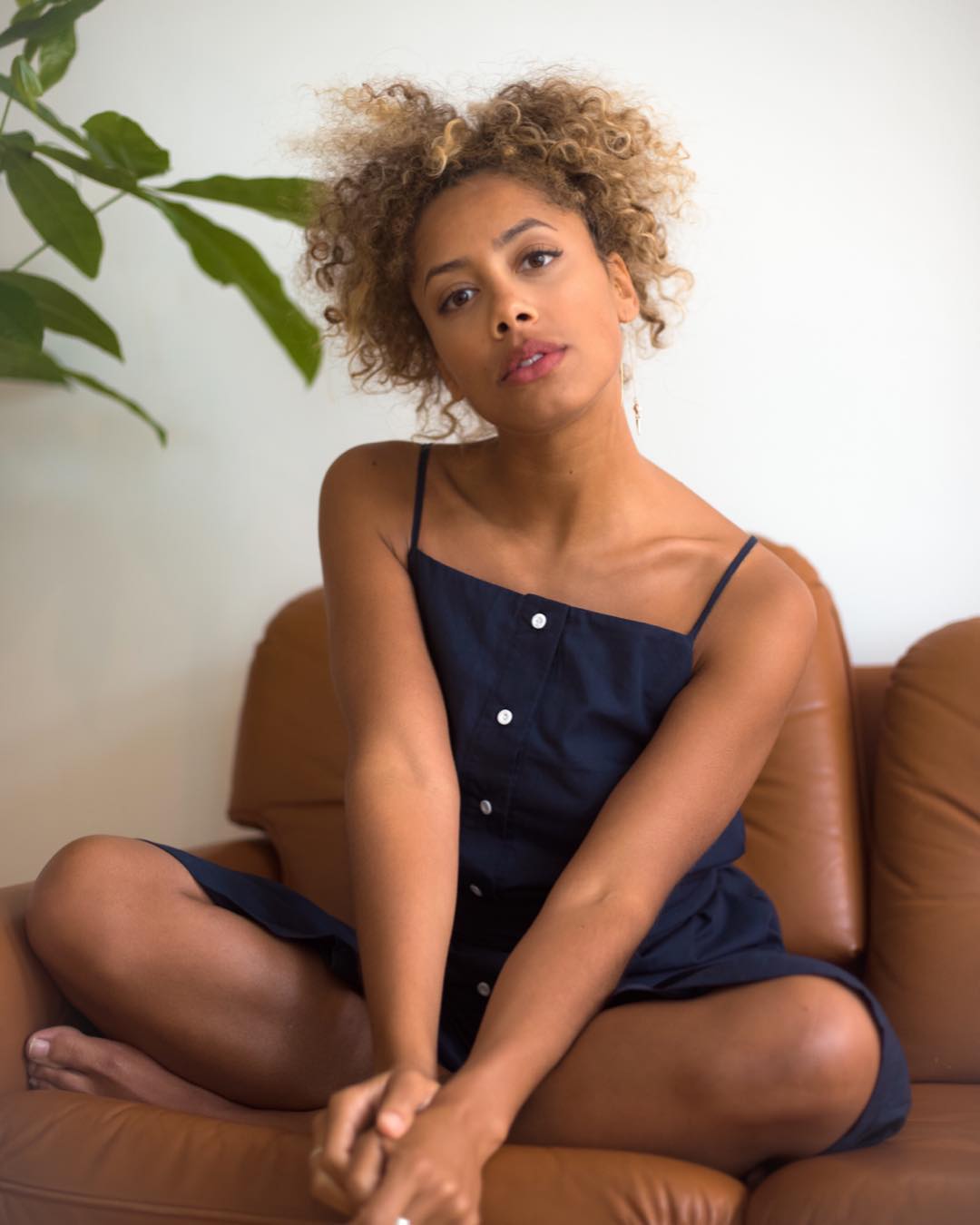
I’ve been to a lot of shows of yours and seen directly how you inspire and impact fans. What really stood out for me was seeing you in Rotterdam. I was in the crowd dancing next to a bunch of young black and brown girls talking about you, in awe of you, literally discussing how great and empowering it was to see you do your thing up there. I see the same thing come back in your socials’ comments too. How has it been for you to be at the receiving end of this? Do you think actively about how you impact others or has this been more of something of an after-effect? “It’s definitely been an after-effect. I’ve really been lucky with my experience. I am a black woman and I definitely carry my culture as a big part of me, but I never actively pursued being a role model as a goal so it never crossed my mind. It really just dawned on me when I went to South Africa, where I played this one show. These girls came up to me and really laid it out to me and told me how special it was to see someone who looks like them commanding the room. They explained how meaningful that was for them, and how empowering it was. It really just hit me at that time, because it brought me back to when I was a kid – watching MTV and MuchMusic and not seeing yourself being represented. I started thinking about who the people who did that for me – and realizing that I now represent that to others. I’m happy to do that. I’m still navigating my own boundaries with that though, and understanding what people put on me as a role model. I should also be able to say – I’m not necessarily what you’re projecting on me. And that ultimately comes back to being your true self.”
I can imagine how daunting it can be to have people look up to you like that. “I don’t know if daunting is necessarily the word – it’s more a form of hyper self-awareness in a way, in terms of what you can really mean to people. I don’t necessarily come at it from a place of fear because I never went into this thinking that this was my goal. I have to remember I don’t owe anyone anything – I only owe to myself that I be the best version of myself.”
Your past year has seen you blow up quite a bit, you’ve travelled a lot, played a myriad of shows and have had Sacred Spaces be received so well. How do you look back on 2017? What has been the most valuable lesson you’ve learned? “I’m coming into a new phase as I don’t have the weight of my master’s thesis to carry alongside my work. I’ve just learned a lot about myself in the past year, and also what is really the most important to me. If anything, this past year has strengthened things that I already believed in – being true to yourself, speaking your truth, not compromising yourself. That wavers with attention and success, so to remind myself of these core values has been really important.”
What can you tell us about this mix? Talk to me about this intro! “I was trying to find a good intro, because I love a good intro. Someone random once told me “Oh you’re always such a happy person, you’re so upbeat!”. And I found this bit from Jill Scott, from one of her live albums, where she talks about how she’s not just always a happy person, and associates it with natural hair and being happy. I just think it’s really funny. I too am a person who is generally happy, and I have natural hair, but these things don’t always go together! [laughs] You need to listen to it to get a good feel of it. The mix itself is slightly different from my normal mixes, it definitely has a lot of tracks that I found on my Asia trip that I mentioned. There’s definitely some Indian influences in there, and also some awesome disco in there, and also some tracks from my musical community in there.”
What’s the perfect setting to blast this mix to? “When you need to feel good. It’s not a party mix – it’s a feel-good mix.”
Lastly, when was the last time you danced? “I last danced in Croatia at SuncéBeat, listening to all these amazing black influential DJs like Sadar Bahar, Rich Medina, Natasha Diggs – I danced hard! The last dance session was a good one.”
Photos by Lukas Korschan and Elizabeth Herring

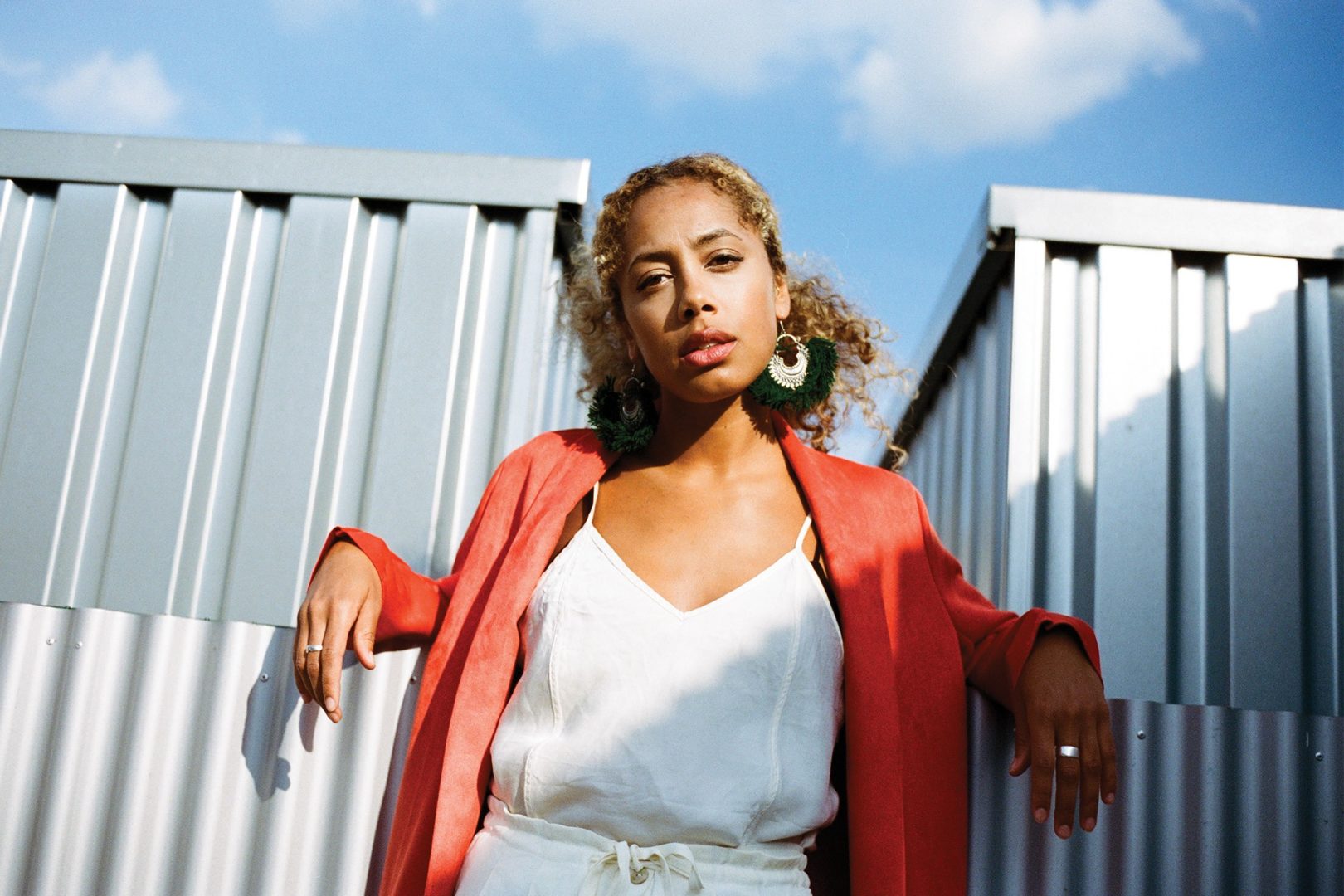
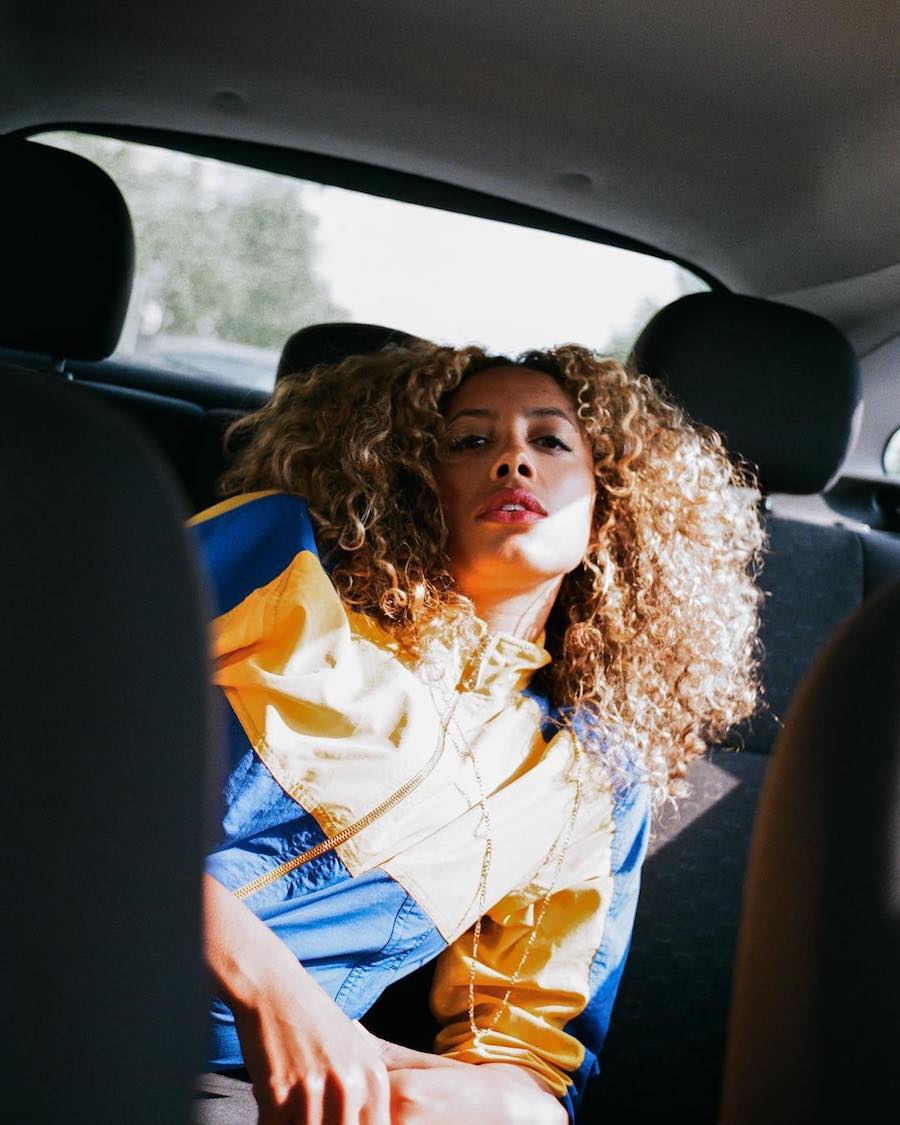
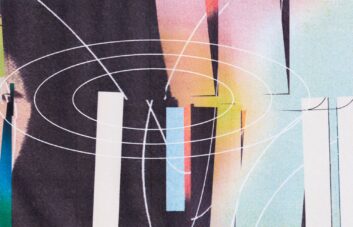
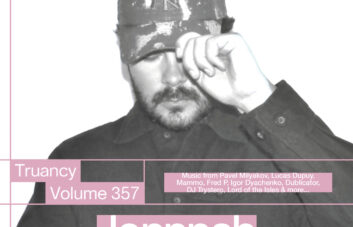
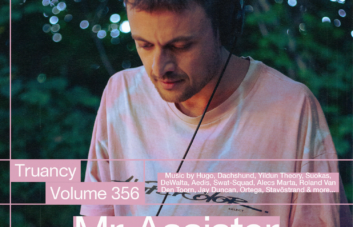
is there any chance you’ll reup this in 320kbps?